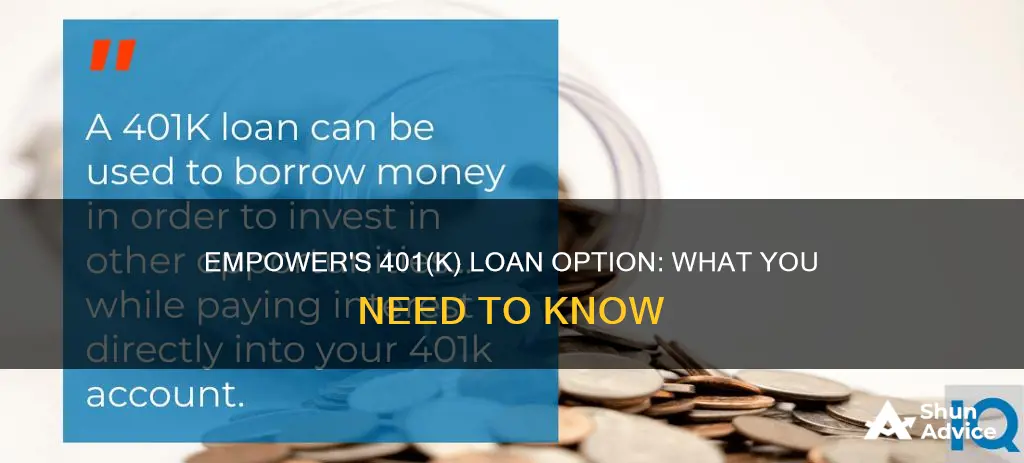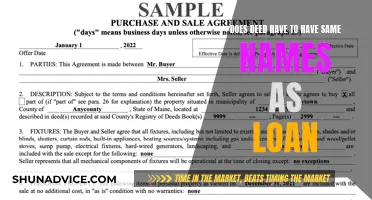
Empower outlines the pros and cons of 401(k) loans on its website. While 401(k) plans are not required to allow loans, they may be a good option in a financial emergency if you can't qualify for a personal loan. There are no credit checks or impact on your credit score, and you avoid income taxes and penalties. However, there are downsides: a 401(k) loan reduces your investment earning potential, and you may have to repay your full loan balance if you leave your job.
Characteristics and Values Table for 401(k) Loans
| Characteristics | Values |
|---|---|
| Credit Check Required | No |
| Impact on Credit Score | No |
| Income Taxes and Penalties | No |
| Early Withdrawal Risks | Yes |
| Repayment Upon Leaving Job | Yes |
| Eligibility | Anyone who meets plan requirements |
| Borrowing Limits | Lesser of 50% of vested balance or $50,000 |
| Vesting | Employer contributions may not be vested |
| Multiple Loans | Yes, under borrowing limits |
| Interest on Loan | Not tax-deductible |
What You'll Learn

No credit check required
While 401(k) plans are not required to offer loans, Empower notes that if a plan does offer loans, anyone can take one out as long as they meet the plan requirements. One of the benefits of a 401(k) loan is that there is no credit check required. This means that even if your credit score is low, you can still take out a loan against your 401(k) plan. This is in contrast to other types of loans, such as personal loans, which often require a credit check and a certain credit score to qualify.
The absence of a credit check for a 401(k) loan can be advantageous, especially if you have a limited or poor credit history. It allows you to access funds without worrying about your creditworthiness. However, it's important to remember that while there is no credit check, there are still other requirements and considerations for a 401(k) loan. For example, you can generally borrow up to 50% of your vested balance or $50,000, whichever is less. Vesting refers to the process of gaining ownership of your employer's contributions to your 401(k) account. Only your vested balance is eligible for a loan, and employer contributions that are not fully vested cannot be used.
Additionally, it's worth noting that while a 401(k) loan may be an option if you need funds and have limited alternatives, it can impact your retirement savings. Taking out a loan from your 401(k) reduces your investment earning potential, which may result in having less money for retirement. It's also important to consider the potential consequences if you leave your job, as you may be required to repay the full loan balance immediately, regardless of whether it was your choice to leave or not.
In summary, while a 401(k) loan from Empower does not require a credit check, it is not the only factor to consider. It is essential to weigh the benefits and drawbacks before deciding whether a 401(k) loan is the right choice for your financial situation.
Deardens and Loans: What's the Connection?
You may want to see also

Avoid income taxes and penalties
Empower does allow 401(k) loans, but it is important to note that not all retirement plans are required to allow participants to take out loans, so you may not be eligible for one. In many cases, the downsides of 401(k) loans may outweigh the benefits, and for this reason, many financial professionals recommend against them.
However, 401(k) loans can be a good alternative to a withdrawal since they allow you to avoid income taxes and penalties, as well as eventually replenish your balance. They also have no credit check requirements and do not impact your credit score.
To avoid income taxes and penalties, it is important to make disciplined repayments to ensure you do not face tax consequences. The loan period is usually within five years, and if you fail to repay the loan within this time frame or upon leaving your job, the outstanding loan balance is treated as a distribution. This means it becomes subject to ordinary income tax, and if you are under 59 1/2, a 10% early withdrawal penalty.
If you are considering a withdrawal, it is important to note that this option comes with significant tax liabilities and potential penalties, especially if taken before retirement age. Withdrawals from a traditional 401(k) are subject to federal and state income tax, and the amount withdrawn is added to your gross income for the year, which can potentially push you into a higher tax bracket.
Cosigning Loans: Impact on SSI Benefits
You may want to see also

Impact on retirement savings
Empower states that 401(k) plans are not required to allow loans, but if a plan does offer one, anyone can take out a loan if they meet the plan requirements. There is no credit check or impact on your credit score, and you avoid penalties such as income taxes and early withdrawal fees. However, it is important to consider the impact on your retirement savings.
A 401(k) loan reduces your investment earning potential, which may reduce the amount of money you have for retirement. The more money you take out for a loan, the less your account will appreciate. This is because your money remains in your 401(k) account, accruing compound interest, which means you earn interest on the interest you previously earned. Therefore, the longer you leave your money in a 401(k) account, the more it will grow.
Research has shown that employees who took out retirement plan loans saved less than their peers who did not take loans and had lower average plan account balances. Employees who took out an average of more than two loans per year had account balances that were 60% smaller than those of employees with no loans. This may be because the money you invest in a 401(k) is untaxed until you start withdrawing in retirement, when you are likely to be in a lower tax bracket. However, if you take out a loan, you will have to repay it with after-tax dollars, which is considered double taxation.
Despite the drawbacks, there are some situations where a 401(k) loan might be a good option. For example, if you are in a financial emergency and your credit doesn't allow you to qualify for a personal loan or other alternatives, a 401(k) loan may be your best option. It is also worth considering if you feel your job is secure, as you may have to repay your full loan balance right away if you leave your job.
Dollar Loan Tree: Leads for Sale?
You may want to see also

Repayment upon leaving your job
If you leave your job, you may have to repay your full 401(k) loan balance right away, whether you left voluntarily or were terminated. This is because, once you are no longer employed, there is no longer a paycheck from which to deduct payments. Your loan could be due and payable in short order, whether or not you have the means to pay it off.
The "termination date" is either your last day of employment with the company or the date your employer set as the last day the plan is active. You must pay off the loan in full no later than 90 days from the termination date. If you do not pay off the loan within this 90-day window, the total outstanding balance will be considered a "loan offset". With a loan offset, the remaining loan amount is reported on a 1099-R and will be treated as a taxable event. The loan offset balance may also be subject to an early distribution penalty of 10% if you are under the age of 59 and a half.
If your loan was in good standing as of the termination date, the distribution will be a qualified plan loan offset (QPLO), and you will have until your tax return due date (plus any requested extensions) for the year of the offset to roll over that amount to another qualified retirement plan or IRA.
If you cannot repay your loan, it will be considered a withdrawal and subject to income taxes and early withdrawal penalties if you are under the age of 59 and a half. You may avoid this tax treatment by repaying or rolling over the loan offset amount to a new employer's 401(k) plan (if permitted by the plan) or to an IRA, as long as this is done by the federal income tax filing deadline, including extensions, for the year in which the offset occurred.
Discover Loan: Co-signers Allowed?
You may want to see also

Alternatives to 401(k) loans
Empower states that 401(k) plans are not required to allow loans, but if a plan does offer one, anyone can take one out if they meet the plan requirements. There is no credit check or impact on your credit score, and you can avoid penalties. However, there are downsides to 401(k) loans, such as the impact on retirement savings and the potential for repayment upon leaving your job. For this reason, many financial professionals recommend against them.
Balance Transfer Cards
If you need a loan to pay off credit card debt, consider a balance transfer card. Some credit cards allow you to pay 0% on balance transfers for an introductory period, often anywhere from six months to two years. As long as you repay the balance within this time, you won't pay any interest. However, you usually need good or excellent credit to qualify, and if you can't repay within the interest-free period, you'll pay a high-interest rate.
Emergency Fund
In an ideal world, you would already have an emergency fund in place to cover unexpected expenses. If you don't, now is the time to start building one so that you don't need to take out a loan.
Personal Loans
If you don't want to tap into your retirement savings, you can look into taking a personal loan. This option may be preferable if you feel your job is secure and you don't want to risk the negative impact on your retirement savings that a 401(k) loan could bring.
Financial Counselling
Some employers may require workers who express interest in borrowing from their 401(k) to first meet with a financial counsellor to discuss the loan's rules, effects, and alternatives. This service is offered at the employer's expense, and after the session, the employee can make a well-informed decision.
Employee Financial Wellness Programs
Some employers offer general employee financial wellness programs that provide free education on topics such as getting out of and staying out of debt, saving and investing for retirement, and creating a budget. These programs can help employees make better financial decisions and avoid the need for loans.
Animal Trap Loans: El Cajon Shelter's Unusual Practice
You may want to see also
Frequently asked questions
In some cases, a 401(k) loan might make sense and be your best option for emergency funds. However, in many cases, the downsides of 401(k) loans may outweigh the benefits and, for that reason, many financial professionals recommend against them.
A 401(k) loan reduces your investment earning potential, which may reduce the amount of money you have for retirement. You may also have to repay your full loan balance right away if you leave your job.
No, there are no credit checks or debt-to-income ratio requirements for a 401(k) loan.







